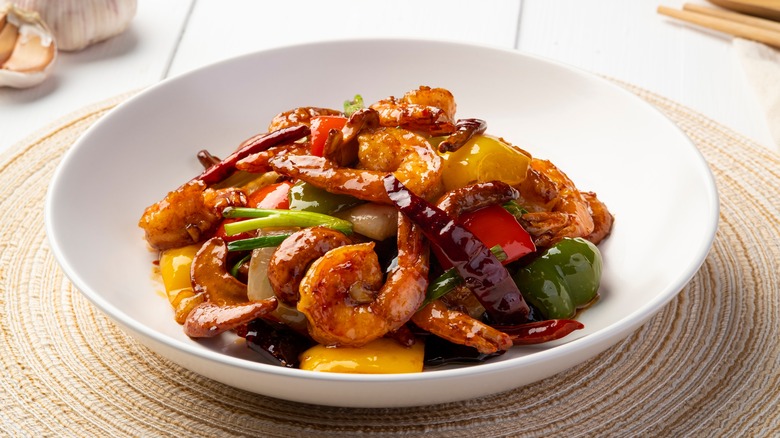Elevate Your Stir Fry Sauce With An Ingredient You Already Have In Your Pantry
There's a hugely important skill set that every capable home cook knows, and it has nothing to do with mincing onions or blanching mustard greens: it's pantry management. When you're stuck between the rock of skyrocketing grocery expenses and the hard place of avoiding unnecessary waste, you need to get pretty good at using up the bunch of carrots sitting forlornly in the crisper drawer or that open, half-empty container of chicken stock. The good news is that you can stir pretty much anything — the more vegetables the merrier, really — and you should consider chicken stock as not only the foundation of every stir fry sauce, but also the best replacement for dry sherry, Shaoxing wine, or sake if you have none to hand.
We put chicken stock in everything, starting with our endlessly adaptable stir fry sauce, as well as every other dish from Chinese Meyer Lemon Chicken to Malaysian chili sesame prawns to chicken in oyster sauce. The reason for this is that chicken stock provides body and background complexity of flavor without dominating the proceedings. You wouldn't think twice about using chicken stock in a shrimp or beef stir fry, but would pause before pairing a hearty beef stock with delicate seafood or vice versa. And goodness knows — any time a stir fry recipe calls for water, you should just go ahead and read that as "chicken stock."
Chicken stock: the most versatile of cooking liquids
Stir frying is done at very high temperatures, which is great for searing proteins but it's murder on liquid ingredients that aren't diluted. You want your oyster sauce to inform the dish with its complexity and sweetness, not stick and burn to a blazing hot wok. It's for this reason that you'll often see sauce ingredients made up of a base liquid in addition to other ingredients like soy sauce and cornstarch. And while plain water will work fine — there's lots of inherent yumminess already coming from the flash-cooked vegetables and meat — it should only be used when the cupboard is bare.
Chicken stock is made by slow-simmering bones and aromatic vegetables (not to be confused with broth, which is made solely from meat). According to the USDA it is full of rich collagens (which provide body), satisfying proteins, a small amount of pleasing sugars, and a bunch of vitamins and minerals from potassium to niacin. The neutral flavor profile of most commercially-based chicken stocks (from both the animal itself to the mirepoix vegetables typically used to make it — onions, celery, and carrots), make it versatile enough to use in every application; even the most robustly-flavored Chinese stir fry. But how would chicken stock work as a pinch hitter for dry sherry, Shaoxing wine, or sake?
Work with the pantry you've got, not the pantry you wish you had
If you happen to have a bottle of Asian cooking wine available, by all means, use that in your stir fry sauce (along with chicken stock). If you're alcohol-free, cooking something more kid-friendly, or have none to hand, chicken stock is the best substitute — with one caveat: stir in a little rice wine vinegar, too.
Obviously, pouring any kind of wine or liquor into an extremely hot cooking environment is going to burn off the alcohol first, so that's not the issue. However, cooking wines will leave a pleasantly sharp, dry (and sometimes caramelly or nutty) aftertaste — flavorful high notes that chicken stock can't provide on its own. By mixing in a touch of rice wine vinegar, you'll have the body and savory complexity of the stock, as well as a crisp finish to the sauce.


